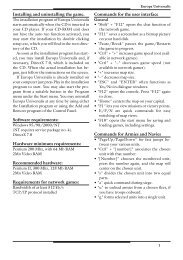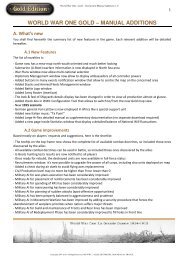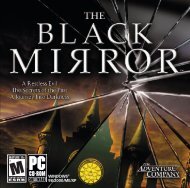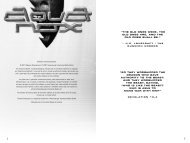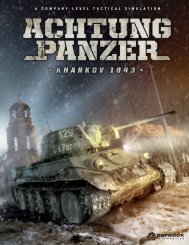Create successful ePaper yourself
Turn your PDF publications into a flip-book with our unique Google optimized e-Paper software.
Historical notes: Organized by the Irish Republican Brotherhood, the<br />
Easter Rising was a rebellion staged in Ireland in Easter Week, 1916 in an<br />
attempt by militant Irish republicans to win independence from Britain. The<br />
Rising lasted from Easter Monday April 24 to April 30, 1916. Members of<br />
the Irish Volunteers, led by schoolteacher and barrister Patrick Pearse,<br />
joined by the smaller Irish Citizen Army of James Connolly, along with 200<br />
members of Cumann na mBan, seized key locations in Dublin and<br />
proclaimed an Irish Republic independent of Britain. There were some<br />
actions in other parts of Ireland but, except for the attack on the RIC<br />
barracks at Ashbourne, County Meath, they were minor.<br />
Conditions: automatic.<br />
Difficulty: die roll 4+.<br />
Enter in play: Events phase, any turn.<br />
Option #1: (historical choice) Uprising in Dublin – A rebellion occurs in<br />
Ireland and Great Britain loses 3 NW points. Great Britain must leave a 3<br />
corps garrison in Ireland unless she suffers an additional -1 NW points loss<br />
every Military phase.<br />
Notes: once successfully in play, the event is discarded and cannot occur<br />
again.<br />
Irish Uprising quelled<br />
Description: This event will remove all negative effects brought in play by<br />
the Spring in Dublin.<br />
Historical notes: After six days of fighting the rising was suppressed, its<br />
leaders court-martialled and executed. However, the uprising led to a surge<br />
of support for the rebels and brought physical force republicanism back to<br />
the forefront of Irish politics. In the 1918 General Election the Republican<br />
Sinn Féin won 73 seats out of 105 with a policy of abstentionism from<br />
Westminster and the creation of an Irish Parliament. This parliament,<br />
known as the First Dáil, and its ministry, called the Aireacht, declared Irish<br />
independence by reaffirming the 1916 declaration.<br />
Conditions: the “Spring in Dublin” event has occurred.<br />
Difficulty: die roll 5+.<br />
Enter in play: Events phase, any turn.<br />
Option #1: (historical choice) Ireland is calm again – Rebellions in Ireland<br />
have been crushed: Great Britain may free the garrisoning Corps that she<br />
may have sent to Ireland.<br />
Notes: once successfully in play, the event is discarded and cannot occur<br />
again.<br />
Revolt in India<br />
Description: This event will generate rebellions in India, where Great Britain<br />
will be forced to leave a big garrison.<br />
Historical notes: Since the beginning of the 20th century, India was in a<br />
nationwide struggle for independence, but growing tensions between<br />
Hindus and Muslims compromised India’s cause. In 1915, Mahatma<br />
Gandhi came onto the scene and was able to unite the effort of both<br />
groups. However, although Gandhi advocated a non-violent revolution, he<br />
wasn’t able to prevent the hotheads from taking the leadership – unrest<br />
spread across the whole subcontinent.<br />
Conditions: automatic.<br />
Difficulty: die roll 4+.<br />
Enter in play: Events phase, any turn.<br />
Option #1: (historical choice) Rebellion – A rebellion occurs in India and<br />
Great Britain loses 5 NW points. Great Britain must leave a 3 corps<br />
garrison in India unless she suffers an additional -1 NW points loss every<br />
Military phase.<br />
Notes: once successfully in play, the event is discarded and cannot occur<br />
again.<br />
End of the Revolt in India<br />
Description: This event will remove all negative effects brought in play by<br />
the Revolt in India.<br />
Historical notes: Having their lesson learned during the Indian Rebellion of<br />
1857, the British garrisons in India crushed the rebellion quickly. Most of<br />
the heads of the rebellion were imprisoned and executed, or enlisted in<br />
punishment battalions and sent to Europe. In the end, the non-violent<br />
revolution intended by Mahatma Gandhi might have been the better way to<br />
choose.<br />
Conditions: the “Revolt in India” event has occurred.<br />
Difficulty: die roll 5+.<br />
Enter in play: Events phase, any turn.<br />
Option #1: (historical choice) India is calm – Rebellions in India have been<br />
crushed: Great Britain may free the garrisoning Corps that she may have<br />
sent to India.<br />
Notes: once successfully in play, the event is discarded and cannot occur<br />
again.<br />
Third Boer War<br />
Description: This event will generate rebellions in South Africa, where<br />
Great Britain will be forced to leave a big garrison.<br />
Historical notes: In August 1914, South Africa, led by Louis Botha and Jan<br />
Smuts, entered the war on the side of the British and sent troops to<br />
conquer the German colony of South-West Africa (Südwest Afrika).<br />
Although South Africa was a British dominion and therefore expected to<br />
World War One: La Grande Guerre 1914-1918 177



